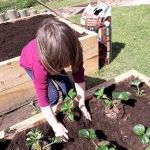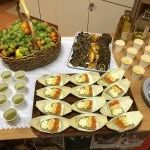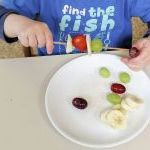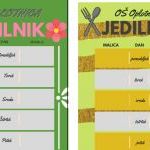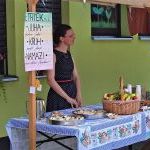Sustainable nutrition in 20 weeks
In this online mentored programme, institutions improve their nutrition in 20 weeks. Work consists of video meetings with instructions; self-study modules; practical work in the workplace; review of the work done with advice from a mentor. The programme aims to create cooperation among teachers and kitchen staff as a pillar of good nutrition and children food habits. In the kitchen, eight sustainable changes are implemented one-by-one and at the same time teachers work on a holistic approach to food. They use the school garden, nature, and food games as tools for teaching subject like maths, languages and biology. Activities have to be fun and are held in an atmosphere of acceptance. At the end of the year their work is presented to the parents and local food producers are invited as well.
Website
Useful links
Food for Life offer support for developing a good food culture in Early Years settings
Country
Media
* TOP TIP *
'Work with the children in your setting to identify eight changes that could be made to the menu to make it more sustainable'
How is the project connected to climate change and sustainability?
Due to positive and sustainable changes to the canteen, the food is better. Children are more satisfied, more food is eaten and less food is wasted. Kitchens are encouraged to make sustainable changes: cooperate with local suppliers who have less transport kilometres; using of fresh, local, seasonal food and if possible to buy ecological food; the use of less packaging, less energy and to donate spare food to those in need. Through a holistic approach – from garden – preparation - food games - children and teachers develop healthy eating habits and respect for food.
Who is involved?
Teachers, children, kitchen employees, mentor of an online course, parents and local suppliers, could be also local public.
How are the participants involved?
A mentor from the online programme presents the content at the beginning of each module and explains the tasks to the participants in video conference. At the end of each module they review the work and talk about the solutions. In the meantime the mentor is available for questions.
The role of the teacher is to create a warm atmosphere and supporting environment for dining. They must understand holistic approach (single actions do not bring results) and involve fun activities (through fun we learn most effectively).
The school kitchen staff think about eight sustainable changes in the kitchen and how and when to implement them – one per month.
The local suppliers who supply the school / kindergarten present their food products at the final event as a part of a farmers market.
The parents get to test the quality of the menus their children eat. Parents are informed about the project and can see sustainable changes on the board of the school / kindergarten. One positive menu change is implemented every 21 days. They are invited to the final event.
Key steps:
Here are some key areas to consider as part of this project.
1. Establish your nutritional team of 4 -5 people who will work with mentor
2. Think about eight sustainable changes you want to have implement this year. These may include reducing food waste, buying more local food, banning fizzy drinks, sourcing organic ingredients or using seasonal produce.
3. Inform the parents - make a table of sustainable changes and think where it can be presented– somewhere where anyone can see it
4. Present your work to the public and parents on the final event: what will be the programme, who will you invite? Don’t forget the journalists!

